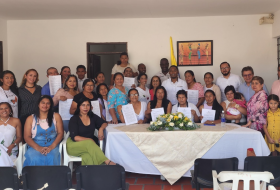News
30 Conciliators in Equity, appointed by the Superior Court of the Judicial District of Cali, have a Unicauca imprint.
As part of the project to 'Increase the supply and use of Conflict Resolution Methods (CRM) in the Valle del Cauca and Cauca regions through the co-implementation of the Conflict Resolution Methods Toolkit with the leadership of a Regional Anchor Actor (AAR),' the University of Cauca has made significant progress. On March 15, the Superior Court of the Judicial District of Cali appointed 30 individuals as Conciliators in Equity through Resolution No. 045
A few months ago, we excitedly shared details of this important process coordinated by the Faculty of Law, Political Science, and Social Sciences and the Legal Clinic of our University, with the support of the USAID Inclusive Justice Program. This project aims to implement the Toolkit, a pedagogical and public policy instrument developed by the Ministry of Justice and Law, which seeks to promote the use of Conflict Resolution Methods in municipalities targeted by Territorial Development Programs (PDET), that is, in those municipalities most affected by the conflict. (If you want to revisit the information or learn more, access the related note by clicking here.)(clic aquí)
Without a doubt, the work has been highly rewarding for a group of researchers from our Alma Mater, who have been responsible for implementing this project in the Valle del Cauca department, specifically in the municipalities of Cali and Buenaventura, and in the Cauca department in the municipality of Corinto. A significant achievement has been the training of trainers, meaning the education of community members in Conflict Resolution Methods. And this work is already bearing fruit: on March 15, in the capital of Valle del Cauca, the Superior Court of the Judicial District of Cali, the highest judicial authority in the area, appointed 30 individuals trained by the University of Cauca as Conciliators in Equity through Resolution No. 045, thus granting them the authority to mediate. What a great story!
This appointment is important because it empowers the 30 individuals trained as Conciliators in Equity to begin performing their mediation functions in Cali. From this appointment, each person can act within their community, meaning they can contribute to resolving conflicts that arise there, leaving a record of their actions,' explained Nelson Freddy Osorio, Technical and Academic Coordinator of the project. He also added that 'The 30 trained individuals will support the three justice houses in Cali: the Agua Blanca Justice House, the Siloé Justice House, and the Alfonso López Justice House.' Thus, through this training process, this institution and regional think tank is impacting various municipalities by providing people with the resources needed to enhance their capabilities and transform lives.
It is important to highlight that the second phase of this significant project will be carried out in the municipalities of Toribío, Caloto, and El Tambo. This valuable opportunity will allow for the training of more people in Conflict Resolution Methods, thereby contributing to peacebuilding by training individuals within their communities. This commitment is part of the Institutional Development Plan of the University of Cauca, which aims to be a supportive and committed institution to its surroundings, ensuring the right to life, peace, reconciliation, and inclusion of differences. Moreover, it is impossible not to emphasize that the University positively impacts the entire southwestern region through the implementation of various projects—projects that are conceived and launched thanks to the experience and expertise of our educational community. We are proud to contribute significantly to regional development and commend the efforts of those making processes like this a reality!
For more information:
Faculty of Law, Political Science, and Social Sciences
Email: derecho@unicauca.edu.co


